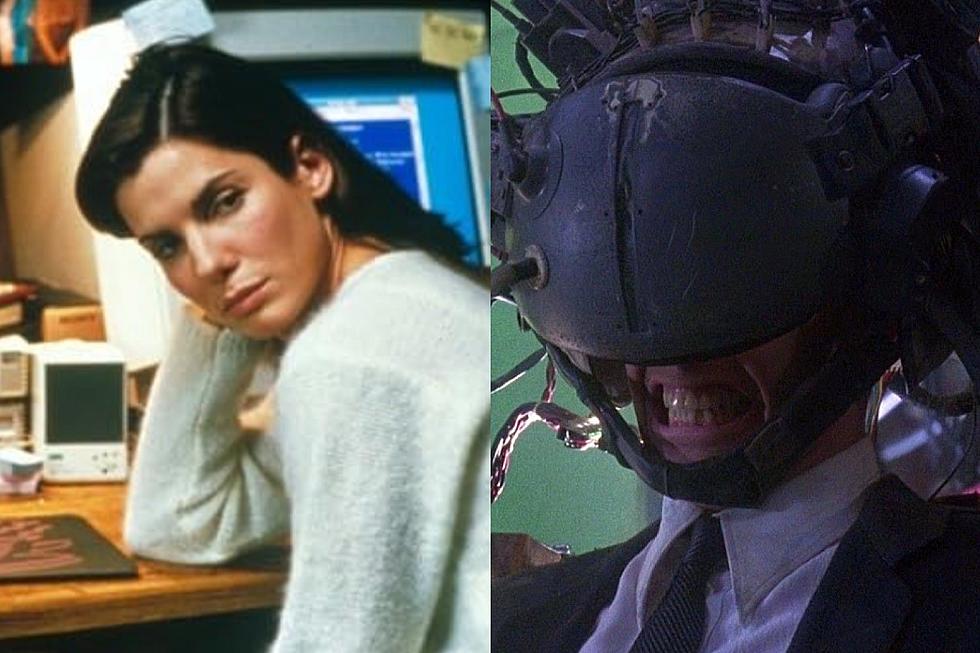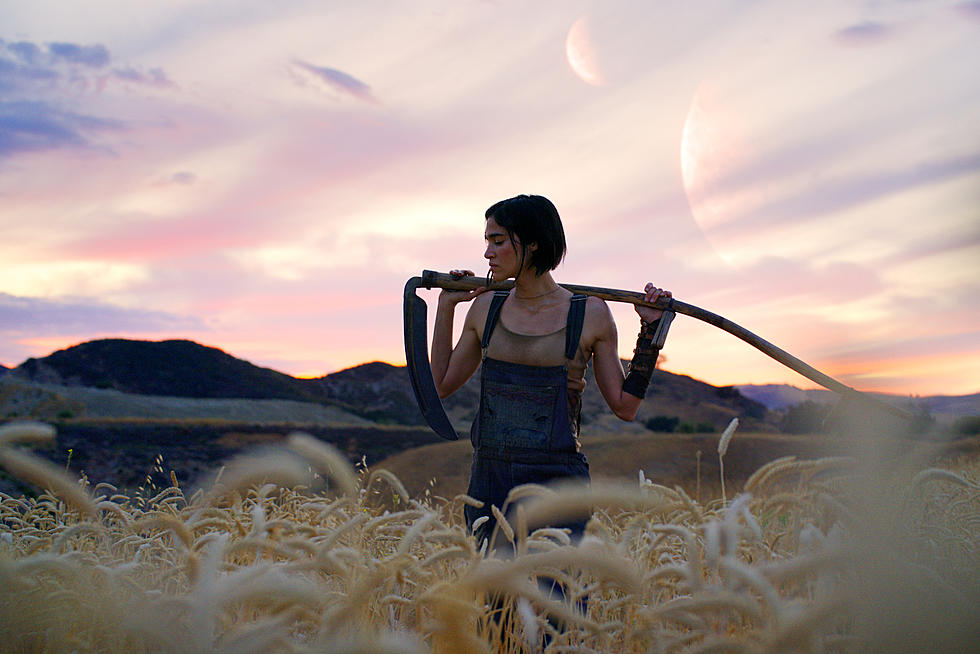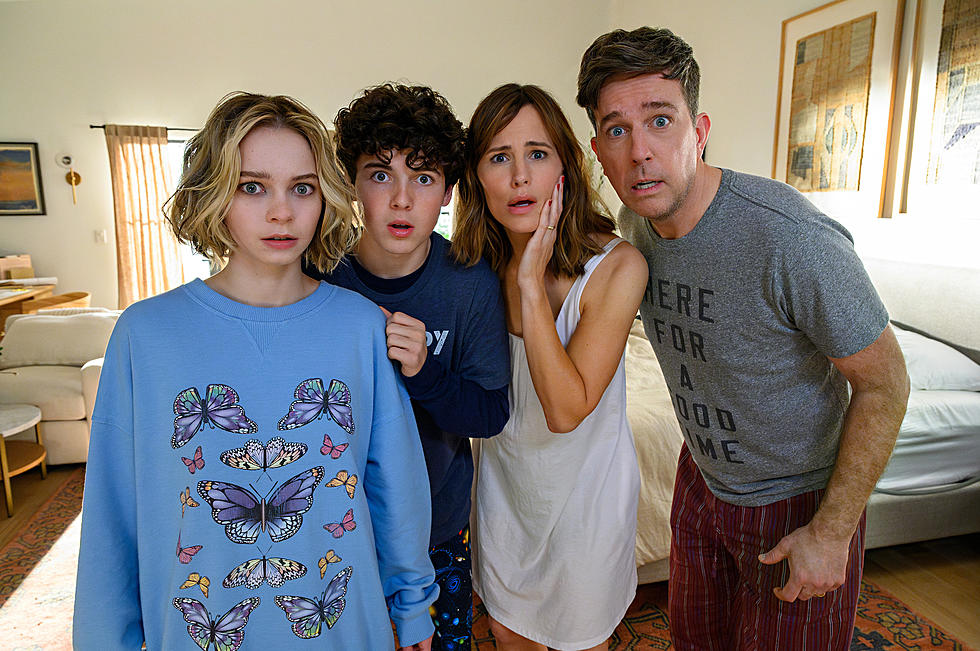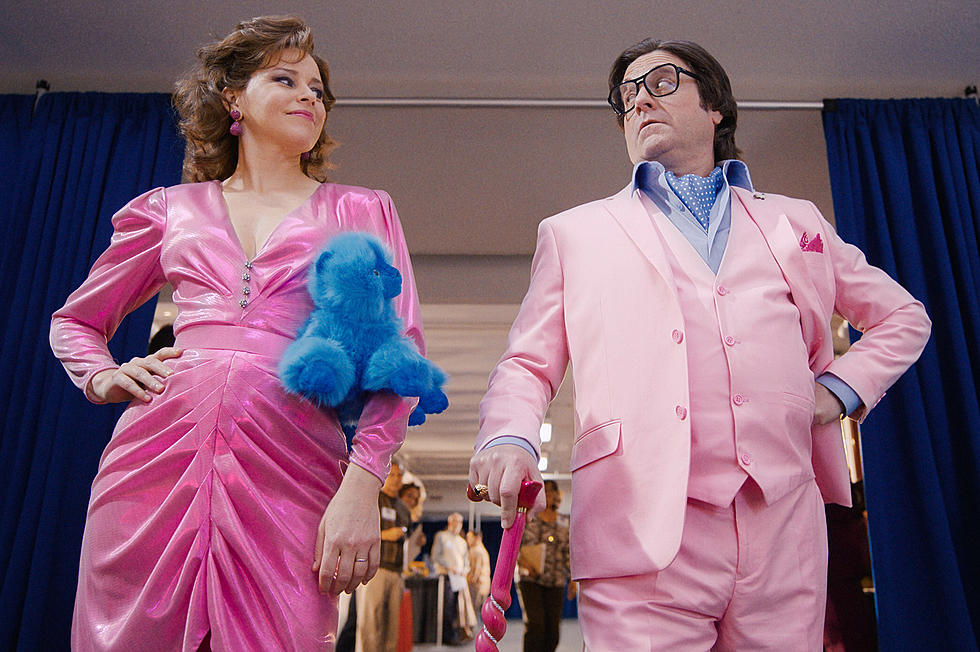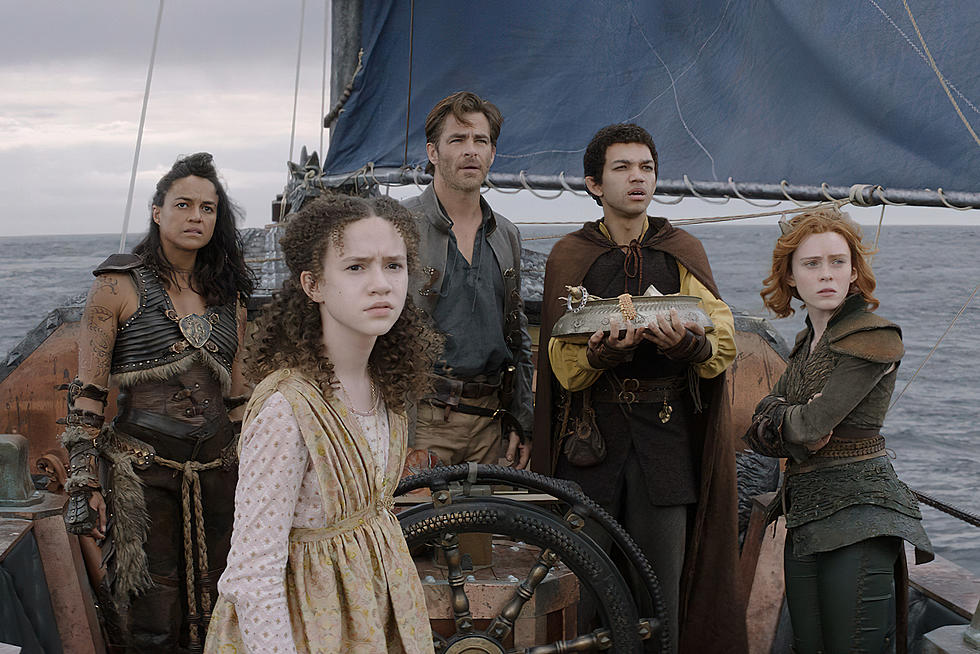
‘Hangover 3′ Interview: Bradley Cooper, Zach Galifianakis and Ed Helms Talk Finishing the Trilogy
Comedy sequels are not uncommon, but trilogies are rare. And yet, 'The Hangover Part III,' the third and presumably final installment in Todd Phillips’ epic saga of four friends who can’t seem to keep themselves sober (or even conscious) when they come together, seems oddly natural given the enormous appeal of its ensemble cast. The film brings Wolf Pack members Phil, Stu, Alan and Doug full circle, returning them to Vegas older and marginally wiser as they try to track down the potty-mouthed Leslie Chow (Ken Jeong) for another gangster (John Goodman) who claims that he stole $21 million in gold bars from him during their first drugged-out stint in Sin City.
We spoke with stars Bradley Cooper, Zach Galifianakis and Ed Helms at Las Vegas’ Caesar’s Palace, where the original and final chapters were filmed about wrapping up the most successful comedy series in movie history. In addition to offering their thoughts about the franchise’s trajectory, they reflected on the star-making experience of playing these now-iconic roles, and offered a few suggestions about how to follow up their collective success with reunion films – in new styles and other genres, no less.
To start, do have a favorite memory or moment of the 'Hangover' trilogy now that it’s over and done? From the first, second, or third one.
ZACH GALIFIANAKIS: I think there’s a day when we were filming the first one that we all kind of agree, as far as a working experience -- the most I’ve ever laughed in my life was the day we shot the first one, I don’t remember if you recall, the older gentleman scene when we were in the hospital with him, and he’s nude. I got the giggles so badly, and so did [Bradley], and so did [Ed]. There was nothing but euphoria running through my body, how much I was laughing. I had to walk off the set I was laughing so hard. That was also the day the election came in 2008. That was a really happy day. A day I will never forget because my body was just beaming with just happiness, because of the giggles from that day and then also what happened that night was a pretty special night.
BRADLEY COOPER: Then we went to Venice, and there was a windstorm that night.
GALIFIANAKIS: Yeah, there was a windstorm that night. It was kind of a special night. But you know, we have so many good days. We have a lot of -- these movies have been really good to us and we enjoy working together, I think, for the most part. Don’t we?
One thing I was really impressed by in this was just how much heart there is. If you each had an insight into your character, you know since it was the last film.
COOPER: I think it’s more along the lines of where I wanted the movie to end up. I think we all think about in terms of the story rather than each individual character. That’s what’s been so special about it, it’s been such a communal endeavor. The filming of the movie, the logistics of it, every day in tackling a scene, it does feel like it’s the four of us. Ideas are thrown and shared and there’s no ownership at all. People sort of say that about collaborative experiences, but this really is the case. It started in the first one, but it really manifested itself in an economical way in the third one. You know, for me, I really wanted it to be -- Alan is one of the most incredible creations of a comedic character in decades in film, so the fact that the story revolves around figuring out who this guy is, how can we tame the beast, was a wonderful choice that Todd Phillips made. Hopefully one that the audience wants to see. My hunch is that it will be because there’s no more lost night, there’s no more inebriated nights devastation. It’s really just let’s take care of our friend.
Alan is the heart of this movie, and he’s been essentially a likable guy, but this one called for him to be objectionable from square one. How did you approach it? Did you feel weird playing Allen this way, the way he was towards Stu and the rest of it?
GALIFIANAKIS: It’s embarrassing, but I don’t overthink things too much when I work. I think that might be evident to a lot of people. As far as Alan goes, in the previous two movies, he is so random and can say anything and it doesn’t even have to make sense, and I think he was just there. He’s there to interject some one liners. With this one, since there is a couple of things that happen to him, meaning the death of his father and the tragedy of a highway, you do have to consider those beats in the script and track that in your mind as far as showing a tinge of him being vulnerable. Also the emotion with Melissa McCarthy. It’s fun for me to couple emotion with comedy. I think it helps comedy. I think a lot of times American comedies don’t play on emotion too much. They go for the joke, and what I like about Todd, and Todd and I did this in 'Due Date,' is we kind of wanted to pull at the heartstrings. Just enough for it to be a bit more real, where Alan’s not just a joke. If that answers your question.
When Todd did 'Hangover II' and 'Due Date,' both of those movies have real darkness to them that 'Hangover' and 'Hangover III' don’t quite have. I was wondering, coming off of the experience of making the second, which was so sort of aggressively dark, did you guys have any particular feelings about will there be a shift in tone you wanted this one to have, or something you wanted this to pivot on from that experience?
GALIFIANAKIS: Can I ask you a question? When you say the second one feels dark, is it because... I find the third one to be dark, in a weird way. Not as dark, but equally dark in a way.
COOPER: Well, there’s killing.
GALIFIANAKIS: I think it’s the finger of a kid, it makes it seems dark, the second one. What do you specifically think is the dark part of the second one?
Both 'Due Date' and 'The Hangover II,' both of them seem sort of mean about their humor. Whereas the first film seems more innocent, or maybe has a stronger emotional undercurrent, so I was just wondering if you felt like there was a comparison.
GALIFIANAKIS: It’s a fair question.
COOPER: I think if you talk to Todd, which I’m sure you will, he would say the third is the darkest. I think that he would say that, just based on the content. I do know, now when you just explained that, all of the characters are unhinged in the second one. They’re out of their comfort zone, they’re in a foreign land, they’re screaming at each other. They’re trying desperately to make their way, but it’s not working. This third one. the goal is to help Allen. To get Doug back, but also to help Allen. To be there for each other. There were a lot more scenes in the third one like the first one, just driving in the car together, in between moments, that the second one didn’t really have as much of. Because the city was so chaotic, there weren’t these quiet moments by roadside, or finding a condom he thinks is a snakeskin. Those sort of things weren’t able to happen in the second, where with the third one there was that room. I’m going off on some sort of other idea, but that was why I enjoyed the third one a lot. We all did. I think we all did get a chance to sort of just sit with each other, the way we did in the first one.
HELMS: I think you’re right, you hit on something that I hadn’t thought a whole lot about, but I did feel like when we made Hangover II, there was an intensity to it. Just being in Bangkok just made the work harder and the energy of it more intense. Getting back here to Vegas for 'Hangover III,' there was like a breath of fresh air and relaxation and familiarity. I don’t if that’s maybe an abstract energy that work it’s way into both movie, but it’s interesting to think about.
Have you perceived the change in Todd going from the first movie to the third movie, since it has seemed like he’s enjoyed more and more creative freedom?
COOPER: I think he’s evolved as we all have. We’ve grown and learned from the first one. Warner Bros. gave him creative flexibility to the nth degree from the first one on, down to marketing and everything, the trailers. It is his vision executed by everybody, including us. I just think cinematically you’re just watching this guy blossom. He’s got like a hundred and ten piece orchestra scoring this one as opposed to Kanye West scoring the first one, basically. The lenses he chose to use to film this one is different. The scope cinematically, this movie is quite stunning visually and rhythmically. No comedy director makes movies like this. There’s not one that you can tell me that I can think of that does it quite this way. I know I speak for us, that’s really why we keep coming back. If any reason Todd Phillips didn’t direct [Hangovers] II or III, there’s no way we’d be there.
Weren’t you signed from the first one for II and III?
HELMS: No.
GALIFIANAKIS: No, nobody had any plans.
COOPER: That would have been pretty hilarious for Warner Bros. to make a trilogy.
HELMS: There’s something incredible -- Todd is a natural leader, he’s a captain. To run a film set of this scale, this complexity, with the decisiveness and clearheadedness that he does is very rare. Even directors that are making giant movies oftentimes it’s more chaotic. Todd just runs the ship, steers the ship through treacherous waters and gets us there every time. It’s really cool if you think about just in terms of how Todd has grown, it’s not like he was a rookie. 'The Hangover' was not his first rodeo, but the scale of each 'Hangover' in complexity from a production standpoint, and that’s been really cool to watch our captain take on bigger ships and just still steer them with scientific precision. The last set piece in 'Hangover III' is so crazy, it’s so huge. We shut down the Strip, and parachutes flying in over, literally over the Bellagio Fountain.
It wasn’t digital?
HELMS: It was a mix, but a lot of it was practical.
COOPER: It was a huge stunt.
Did you guys hang off the building at all?
COOPER: We hung off a building they built on a sound stage.
GALIFIANAKIS: It was six floors up, I think.
COOPER: It was the highest sound stage Warner Bros. has, because it goes down, deep down into the ground.
HELMS: They basically built the top six floors of a building, it was crazy.
Were you afraid?
GALIFIANAKIS: I’m terrible at heights. I hate it. I’m glad I’m only 5'7".
After filming the last scene, what is it like finally watching the movie with the editing, the score. What was your reactions watching the movie?
GALIFIANAKIS: We cried.
HELMS: I don’t know. I’m always stunned seeing these little nuggets we spent three months shooting in such specificity. These different angles, we repeat things over and over to get the right version, and then you don’t know what it’s going to look like. The only person who’s got his mind’s eye on all of it is Todd, and maybe Larry [Sher], our DP. I think it’s a magical thing, it’s really, really fun. Probably my favorite thing about watching a movie that I’m in the first time is to see all the things I didn’t know were happening in a scene around me, all the little expressions that these guys have. Reactions to things or maybe Todd laughed at something on set, and I didn’t know why and then I see, oh, because Zach did that in the background or some great little nugget. It’s so crazy and ridiculous what we get to do.
GALIFIANAKIS: You’re also in it so much that you don’t really -- I loved 'Hangover III,' I laughed a lot actually. I emailed Ed to tell him how much his one line made me laugh out of all three movies, his joke. What I like about the third one is that we comment on the movie a little and the franchise, when I put the glasses on Carlos and Phil goes, "Oh God." I feel like Todd left that in there, and we’re commenting like, "Oh, this is a cheesy moment, but we know some people might like this. Just bear with us. We don’t necessarily agree with this, but this is for somebody that might like it." And I love that that’s in there. I don’t know if people read into that, but I get to read into that. That’s enjoyable for me, because I have that little inside work insight and that line’s enjoyable for me. It probably doesn’t mean anything to anybody else, but for me it’s fun to watch that kind of stuff.
You guys are talking about not doing a fourth, but would you guys collaborate ever again? You can’t deny the chemistry you guys have.
COOPER: I would love to.
GALIFIANAKIS: We would like to do it if we switched genres, I think that would be fun.
Astronauts or something.
HELMS: Yeah, I would do anything with these guys.
COOPER: Zach had a good idea yesterday that we just do 'Hangover IV' with a Flip Cam.
GALIFIANAKIS: Make it like a mumblecore thing. It’s not that exciting, but it’s got good dialogue.
HELMS: We should all do sequels to Midnight Meat Train, Cedar Rapids, and It’s Kind of a Funny Story.
Considering how much money Caesar’s Palace has been contributing to you guys, or how much you’ve made off of them, because clearly you’ve generated millions for this hotel. A slot machine, you guys have a slot machine. Have you played it?
GALIFIANAKIS: I haven’t played it.
HELMS: I played it last night.
GALIFIANAKIS: You did?
HELMS: I played 'The Hangover' slot machines right after I went to the Rolling Stones concert last night. It was amazing, and I went and played 'The Hangover' slot machine and won $200.
GALIFIANAKIS: Life is really coming together for you.
More From ScreenCrush
